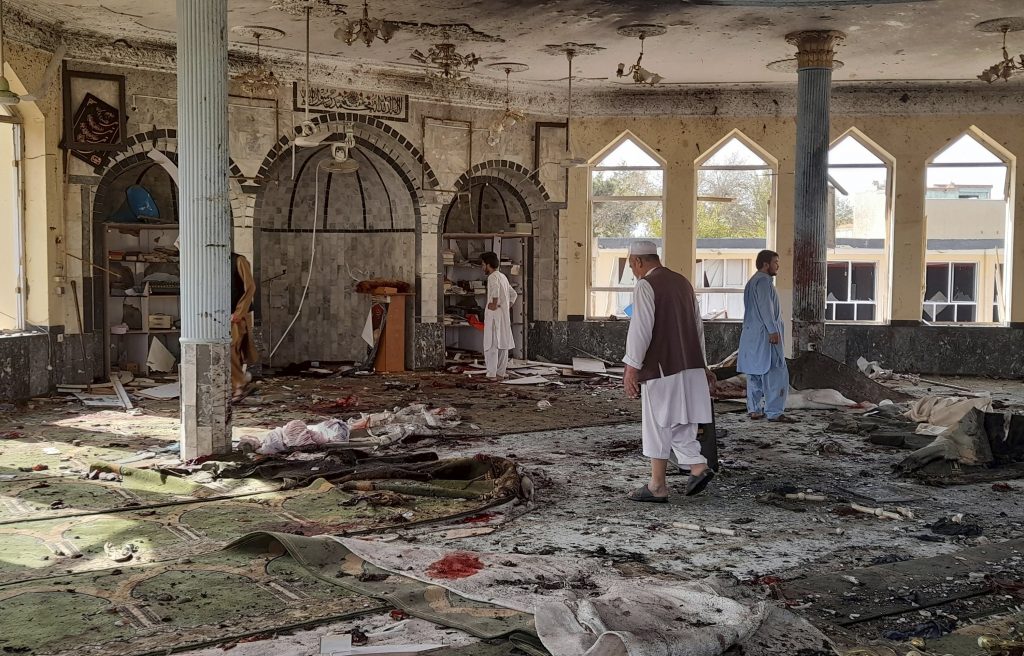Kabul: A Taliban police official has said at least 100 people have been killed and wounded Friday in a mosque explosion targeting Shiite Muslims in northern Afghanistan. The toll could rise as the exact number of bodies is yet to be counted. Dost Mohammad Obaida, the police official said the ‘majority of them have been killed’. The blast was suicide attack, a Taliban official claimed.
There was no immediate claim for the blast in Kunduz province, but Islamic State (IS) militants have a long history of attacking Afghanistan’s Shiite Muslim minority.
If confirmed, the death toll in Friday’s attack would be the highest in an attack by militants since US and NATO troops left Afghanistan at the end of August and the Taliban took control of the country.
Residents of Kunduz, the capital of a province of the same name, told news agency AFP the blast hit a Shiite mosque during Friday prayers. Incidentally Friday is the most important of the week for Muslims.
Zalmai Alokzai, a local businessman who rushed to Kunduz Provincial Hospital to check whether doctors needed blood donations, described horrific scenes. “I saw more than 40 dead bodies,” he said. “Ambulances were going back to the incident scene to carry the dead,” Alokzai added.
An international aid worker at the MSF hospital in the city told there were fears the death toll could rise. “Hundreds of people have gathered at the main gate of the hospital and crying for their relatives but armed Taliban guys are trying to prevent gatherings in case another explosion is planned,” he said.
Graphic images shared on social media, which could not immediately be verified, showed several bloodied bodies lying on the floor. Another video showed men shepherding people, including women and children, away from the scene. Frightened crowds thronged the streets.
Kunduz’s location makes it a key transit point for economic and trade exchanges with Tajikistan. It was the scene of fierce battles as the Taliban fought their way back into power this year.
Often targeted by Sunni extremists, Shiite Muslims have suffered some of Afghanistan’’ most violent assaults, with rallies bombed, hospitals targeted and commuters ambushed.
Shiites make up roughly 20 percent of the Afghan population. Many of them are ‘Hazara’, an ethnic group that has been heavily persecuted in Afghanistan for decades.
Obaida, the deputy police chief for Kunduz province, said that the attack may have been carried out by a suicide bomber who mingled among the worshippers. “I assure our Shiite brothers that the Taliban are prepared to ensure their safety,” Obaida said. He also added that an investigation has also been launched to identify the culprits.
The Taliban have been targeted in a series of deadly IS attacks, including shooting ambushes and an explosion at a mosque in the capital of Kabul.
The explosion went off during the weekly Friday prayer service at the Gozar-e-Sayed Abad Mosque. The Friday noon prayer is the highlight of the Muslim religious week, and mosques are typically crowded. Witness Ali Reza said he was praying at the time of the explosion and reported seeing many casualties.
Earlier Friday, the chief Taliban spokesman Zabihullah Mujahid said the Shiite mosque was the target and that a ‘large number’ of worshippers were killed and wounded. He said Taliban special forces had arrived at the scene and were investigating the incident.
The Taliban leadership has been grappling with a growing threat from the local Islamic State affiliate, known as the Islamic State in Khorasan. IS militants have ramped up attacks to target their rivals, including two deadly bombings in Kabul.
IS has also targeted Afghanistan’s religious minorities in attacks. The local Islamic State affiliate claimed responsibility for the horrific August 26 bombing that killed at least 169 Afghans and 13 US military personnel outside the Kabul airport in the final days of the chaotic American pullout from Afghanistan.
Since the U.S. Pullout, IS attacks have been mostly in eastern Afghanistan — the regional base for the IS affiliate — and in Kabul.
Ethnic ‘Hazaras’, who are mostly minority Shiite Muslims make up about six per cent of Kunduz’s population of nearly one million people. The province also has a large ethnic Uzbek population that has been targeted for recruitment by the IS, which is closely aligned with the Islamic Movement of Uzbekistan.
Friday’s attack, if claimed by IS, will also be worrying for Afghanistan’s northern Central Asian neighbours and Russia, which has been courting the Taliban for years as an ally against the creeping IS in the area.
